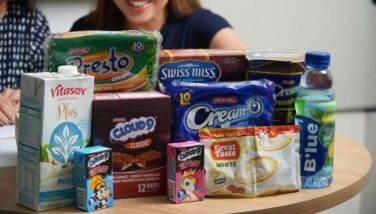From fish to fork
September 29, 2003 | 12:00am
Have you ever wondered how your favorite supermarket could offer fresh fish for sale at prices lower than the going price in the wet market?
Fisher Farms, Inc. gives part of the answer.
This barely three-year-old company based in Magalang, Pampanga supplies fresh, frozen, and processed aquaculture products to the country’s premier supermarkets and special food retail clients.
The product list covers chilled, frozen, deboned, filleted, cubed, smoked, dried, marinated, breaded and canned fish, with special emphasis on St. Peter’s fish (tilapia), milkfish (bangus), and catfish (hito).
"Filipinos are generally meat eaters. By providing them the incentive to buy through pricing strategies, we will be able to develop the market which will lead to higher margins in the long run," said Fisher Farms general manager Alvin Gimelo.
The fresh fish market is essentially driven by volume. However, value added fish products have the potential to compete once it finds its market. Promising products are sausages (longganiza), spring rolls (lumpia), and wonton (siomai), which target the health conscious and the senior citizens, who are naturally inclined to eat balanced meals.
"These value-added products are more expensive than pork-based products but what is the price of our health?’ said Gimeno.
Fisher Farms is an integrated fish operation, controlling the production of its output from the grandparent and parent stock fish breeding farms to hatchery, feedmilling, fish growing and processing.
"We source our products direct from the farms, ensuring freshness and quality. That’s quality in terms of having histamine levels within standards, being free from antibiotic residues, and meeting microbiological standards," said Gimeno.
In addition, Fisher Farms can enter into long-term, fixed price contracts, a unique proposition, considering the daily fluctuations in fish prices even at its own fishing port. "We produce according to what our clients want in terms of size, weight and even color with regard to tilapia," he said
From its first year of production in 2001, sales have more than doubled to P50 million in 2002. The company is on target to grow by at least 50% this year and aims to double its business every year until 2005.
To support this direction, a P70-million fish processing plant will be set up in Pulilan, Bulacan. The plant will be equipped with IQF (individually quick frozen) freezers, a state-of-the art smokehouse from Germany, and a controlled temperature environment. It will also be certified under HACCP (Hazard Analysis for Critical Control Points), a quality management system that addresses food safety through the analysis of biological, chemical, and physical hazards "from farm to fork" or from growing, harvesting, processing, manufacturing, distributing, and merchandising to preparing food for consumption.
With its new HACCP-accredited plant, Fisher Farms is gearing to tap the export market in phases, first for IQF frozen whole and IQF frozen gutless and scale fish; and second, for value-added products such as nuggets and sausages.
It is also strengthening its domestic market base through supermarkets and restaurants. Indeed, the low-margin supermarket fresh fish market is only the beginning for Fisher Farms, now well on its way to its audacious goal of industry dominance.
Fisher Farms, Inc. gives part of the answer.
This barely three-year-old company based in Magalang, Pampanga supplies fresh, frozen, and processed aquaculture products to the country’s premier supermarkets and special food retail clients.
The product list covers chilled, frozen, deboned, filleted, cubed, smoked, dried, marinated, breaded and canned fish, with special emphasis on St. Peter’s fish (tilapia), milkfish (bangus), and catfish (hito).
"Filipinos are generally meat eaters. By providing them the incentive to buy through pricing strategies, we will be able to develop the market which will lead to higher margins in the long run," said Fisher Farms general manager Alvin Gimelo.
The fresh fish market is essentially driven by volume. However, value added fish products have the potential to compete once it finds its market. Promising products are sausages (longganiza), spring rolls (lumpia), and wonton (siomai), which target the health conscious and the senior citizens, who are naturally inclined to eat balanced meals.
"These value-added products are more expensive than pork-based products but what is the price of our health?’ said Gimeno.
"We source our products direct from the farms, ensuring freshness and quality. That’s quality in terms of having histamine levels within standards, being free from antibiotic residues, and meeting microbiological standards," said Gimeno.
In addition, Fisher Farms can enter into long-term, fixed price contracts, a unique proposition, considering the daily fluctuations in fish prices even at its own fishing port. "We produce according to what our clients want in terms of size, weight and even color with regard to tilapia," he said
From its first year of production in 2001, sales have more than doubled to P50 million in 2002. The company is on target to grow by at least 50% this year and aims to double its business every year until 2005.
With its new HACCP-accredited plant, Fisher Farms is gearing to tap the export market in phases, first for IQF frozen whole and IQF frozen gutless and scale fish; and second, for value-added products such as nuggets and sausages.
It is also strengthening its domestic market base through supermarkets and restaurants. Indeed, the low-margin supermarket fresh fish market is only the beginning for Fisher Farms, now well on its way to its audacious goal of industry dominance.
BrandSpace Articles
<
>
- Latest
Latest
Latest
February 21, 2025 - 3:09pm
February 21, 2025 - 3:09pm
February 21, 2025 - 9:00am
February 21, 2025 - 9:00am
February 13, 2025 - 12:00am
February 13, 2025 - 12:00am
January 30, 2025 - 4:05pm
January 30, 2025 - 4:05pm
January 27, 2025 - 11:00am
By Jay Ann Bonghanoy | January 27, 2025 - 11:00am
January 24, 2025 - 8:00am
January 24, 2025 - 8:00am
Recommended

























